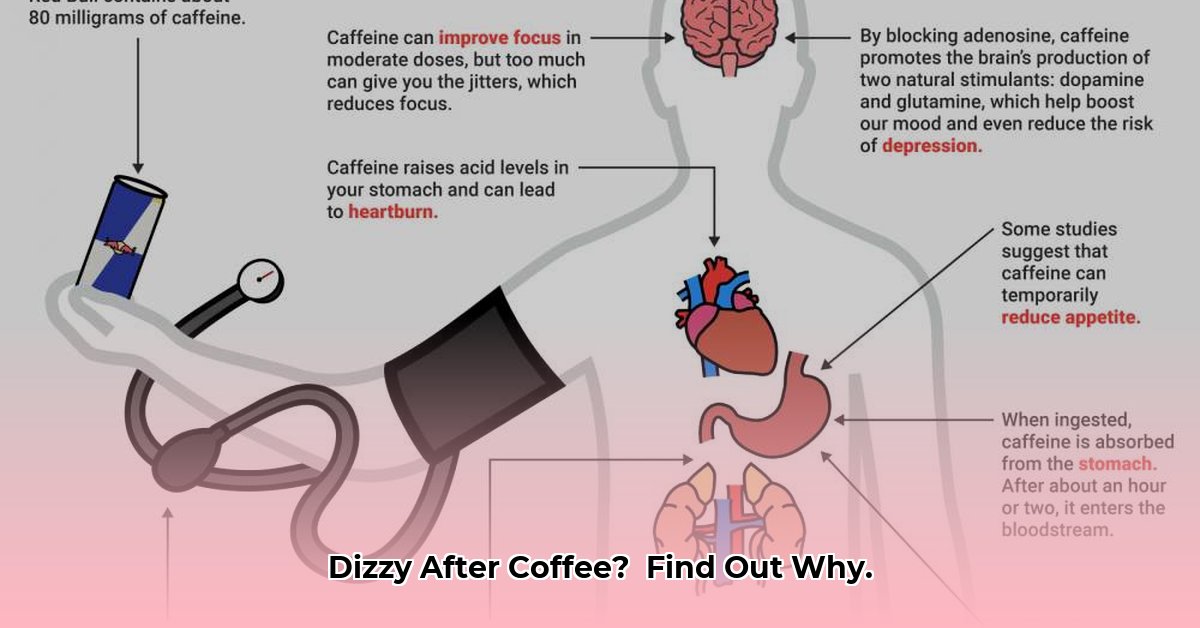Decoding the Dizzying Effects of Caffeine
Yes, caffeine can indeed cause dizziness. While many enjoy caffeine’s stimulating effects without issue, some individuals are more sensitive and may experience dizziness even with small doses. This guide explores the science behind this phenomenon, offering practical tips for management and prevention.
Why Your Coffee Might Be Making You Spin
Caffeine primarily works by blocking adenosine, a neurotransmitter that promotes relaxation and sleepiness. This blockage can lead to several physiological changes that may contribute to dizziness:
- Blood Vessel Constriction: Caffeine can cause blood vessels in the brain to temporarily narrow, potentially reducing blood flow. This reduced flow can lead to feelings of lightheadedness.
- Increased Heart Rate and Blood Pressure: Caffeine can temporarily elevate both heart rate and blood pressure. While typically mild, this increase can exacerbate dizziness, especially in individuals sensitive to blood pressure fluctuations.
- Dehydration: Caffeine’s diuretic properties increase urination, potentially leading to dehydration if fluid intake isn’t balanced. Dehydration is a common cause of dizziness and can amplify caffeine’s effects.
- Anxiety Exacerbation: Caffeine can worsen anxiety symptoms in susceptible individuals, and anxiety itself can be linked to dizziness and lightheadedness.
- Interaction with Medical Conditions: For individuals with conditions like Meniere’s disease or vestibular migraines, caffeine may intensify pre-existing dizziness or vertigo. Conversely, some individuals find caffeine relieves migraine-related dizziness, demonstrating its complex and individualized effects.
Recognizing Caffeine-Induced Dizziness
Symptoms of caffeine-related dizziness can vary, including:
- Lightheadedness
- Unsteadiness
- Vertigo (a spinning sensation)
- Blurred vision
If these symptoms are persistent or severe, consult a healthcare professional to rule out other potential causes.
Taming the Caffeine-Induced Spin: Practical Tips
You don’t have to give up caffeine entirely to avoid dizziness. Here’s how to manage your intake:
- Moderate Consumption: Stick to the recommended limit of 400mg of caffeine per day for healthy adults. Track your intake across all sources (coffee, tea, energy drinks, chocolate).
- Hydrate Consistently: Drink plenty of water throughout the day, especially alongside caffeinated beverages.
- Eat Before You Caffeinate: Consuming caffeine on an empty stomach can intensify its effects. Eating beforehand can help stabilize blood sugar and minimize dizziness.
- Gradual Reduction: If cutting back, decrease intake gradually to avoid withdrawal symptoms, which can ironically include dizziness.
- Explore Alternatives: Consider decaf coffee, herbal teas, or fruit-infused water for a caffeine-free boost.
Dizziness First Aid: Managing a Caffeine-Induced Episode
If you experience a dizzy spell after consuming caffeine:
- Stop Caffeine Intake: Avoid further caffeine until the dizziness subsides.
- Rehydrate: Drink water or an electrolyte-rich beverage.
- Stabilize Blood Sugar: Eat a small snack with protein and carbohydrates.
- Rest: Sit or lie down in a quiet place.
- Seek Medical Attention: If dizziness is severe, persistent, or accompanied by other symptoms (blurred vision, chest pain, difficulty speaking), seek immediate medical attention.
Caffeine Content of Common Beverages
| Beverage | Caffeine (mg) (Approximate Range) |
|---|---|
| Brewed Coffee (8 oz) | 95-200 |
| Espresso (1 oz) | 63-100 |
| Black Tea (8 oz) | 47-90 |
| Green Tea (8 oz) | 28-47 |
| Cola (12 oz) | 35-45 |
| Energy Drink (8 oz) | 70-100+ (Check the Label) |
| Dark Chocolate (1 oz) | 15-20 |
| Milk Chocolate (1 oz) | 5-10 |
When to See a Doctor
While occasional caffeine-induced dizziness is usually not a cause for alarm, persistent or severe episodes warrant medical attention. A doctor can rule out underlying medical conditions and provide tailored advice.
Disclaimer: This information is for educational purposes only and does not constitute medical advice. Consult a healthcare professional for any health concerns or before making any decisions related to your health or treatment.
Note: Current research on caffeine’s effects is ongoing. The information provided here reflects the current understanding, but further research may provide more insights.
- Separated Lunch Containers Keep Different Foods Fresh and Organized - February 13, 2026
- Divided Containers Simplify Meal Prep for Busy Individuals - February 12, 2026
- Why Sectioned Food Containers Are Best for Meal Prep - February 11, 2026










